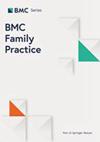Factors associated with usability of the EMPOWER-SUSTAIN Global Cardiovascular Risks Self-Management Booklet© among individuals with metabolic syndrome in primary care: a cross-sectional study
IF 3.2
3区 医学
Q1 MEDICINE, GENERAL & INTERNAL
引用次数: 0
Abstract
Self-management support has been recognized as one of the most essential elements of the Chronic Care Model (CCM). Inspired by the CCM, the EMPOWER-SUSTAIN Global Cardiovascular Risks Self-Management Booklet© was developed to aid and sustain self-management among patients with metabolic syndrome (MetS) in primary care to prevent cardiovascular complications. However, the usability of this booklet among these patients is not known. Therefore, this study aimed to evaluate the usability of this self-management booklet and identify the factors associated with its usability among patients with MetS in primary care. This cross-sectional study was conducted among patients with MetS attending a university primary care clinic in Selangor, Malaysia. The usability score was measured using a previously translated and validated EMPOWER-SUSTAIN Usability Questionnaire (E-SUQ) with a score of > 68 indicating good usability. Multiple logistic regressions determined the factors associated with its usability. A total of 391 patients participated in this study. More than half (61.4%) had a good usability score of > 68, with a mean (± SD) usability score of 72.8 (± 16.1). Participants with high education levels [secondary education (AOR 2.46, 95% CI 1.04, 5.83) and tertiary education (AOR 2.49, 95% CI 1.04, 5.96)], those who used the booklet at home weekly (AOR 2.94, 95% CI 1.63, 5.33) or daily (AOR 2.73, 95% CI 1.09, 6.85), and those who had social support to use the booklet (AOR 1.64, 95% CI 1.02, 2.64) were significantly associated with good usability of the booklet. The usability of the EMPOWER-SUSTAIN Global Cardiovascular Risks Self-Management Booklet© was good among patients with MetS in this primary care clinic, which supports its widespread use as a patient empowerment tool. The findings of this study also suggest that it is vital to encourage daily or weekly use of this booklet at home, with the support of family members. The focus should also be given to those with lower education to improve the usability of this booklet for this group of patients.与基层医疗机构代谢综合征患者对《EMPOWER-SUSTAIN 全球心血管风险自我管理手册© 》的可用性相关的因素:一项横断面研究
自我管理支持被认为是慢性病护理模式(CCM)最基本的要素之一。受 CCM 的启发,我们开发了 EMPOWER-SUSTAIN Global Cardiovascular Risks Self-Management Booklet©,以帮助和维持初级保健中代谢综合征(MetS)患者的自我管理,从而预防心血管并发症。然而,该手册在这些患者中的可用性尚不清楚。因此,本研究旨在评估这本自我管理手册的可用性,并确定与基层医疗机构代谢综合征患者可用性相关的因素。这项横断面研究的对象是在马来西亚雪兰莪州一所大学初级保健诊所就诊的 MetS 患者。使用之前翻译和验证过的 "EMPOWER-SUSTAIN可用性问卷"(E-SUQ)测量可用性得分,得分大于 68 分表示可用性良好。多重逻辑回归确定了与可用性相关的因素。共有 391 名患者参与了这项研究。半数以上(61.4%)的可用性得分大于 68 分,平均(± SD)分为 72.8(± 16.1)分。教育程度高的参与者[中等教育(AOR 2.46,95% CI 1.04,5.83)和高等教育(AOR 2.49,95% CI 1.04,5.96)]、每周在家使用手册(AOR 2.94,95% CI 1.63,5.33)或每天使用(AOR 2.73,95% CI 1.09,6.85),以及在使用小册子时得到社会支持的人群(AOR 1.64,95% CI 1.02,2.64)与小册子的可用性显著相关。在该初级保健诊所的 MetS 患者中,"EMPOWER-SUSTAIN 全球心血管风险自我管理手册"© 的可用性很好,这支持了其作为患者赋权工具的广泛应用。这项研究的结果还表明,在家庭成员的支持下,鼓励患者每天或每周在家中使用这本小册子至关重要。还应重点关注教育程度较低的患者,以提高这部分患者对这本手册的可用性。
本文章由计算机程序翻译,如有差异,请以英文原文为准。
求助全文
约1分钟内获得全文
求助全文
来源期刊

BMC Family Practice
医学-医学:内科
CiteScore
3.20
自引率
0.00%
发文量
0
审稿时长
4-8 weeks
期刊介绍:
BMC Family Practice is an open access, peer-reviewed journal that considers articles on all aspects of primary health care research. The journal has a special focus on clinical decision making and management, continuing professional education, service utilization, needs and demand, and the organization and delivery of primary care and care in the community.
 求助内容:
求助内容: 应助结果提醒方式:
应助结果提醒方式:


